Shahadah (Faith)
Obligation
Prayer is obligatory upon every adult Muslim of sound mind. As far as children are concerned, it is not obligatory on them until they come of age. When children reach the age of 7, parents should urge them to be regular in their Prayers and when they reach the age of 10, they must be admonished if they fail to offer their Prayers regularly. (Sunan Abu Dawud, Kitabus-Salat). Once children reach the age of maturity, it becomes compulsory for them to offer their Prayers.

The word Wudu implies washing some parts of the body in a specific manner as described below. This is a prerequisite which must be fulfilled, otherwise the Prayer will not be considered valid.
Step 1) Wash hands three times with water and then clean your mouth by rinsing three times.
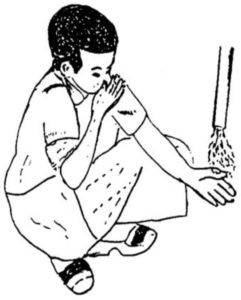
Step 2) Clean the nose internally by pushing a little water into the nostrils three times.
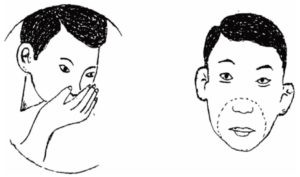
Step 3) Wash the entire face three times.
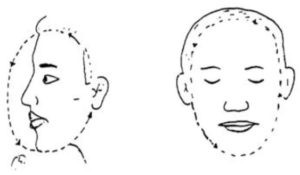
Step 4) Wash both arms, up to and including the elbow, three times each, starting with the right.
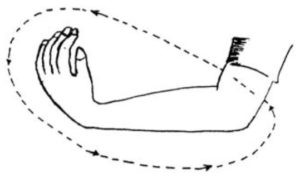
Step 5) After wetting the hands with some water, make a pass over the head with both hands, palms downwards with thumbs outstretched so that almost the whole head is covered by this in a passing motion. At the end of this motion, clean the ears with the tips of the forefingers. The forefinger of the right hand is used for the right ear and the forefinger of the left hand is used for the left ear. The finger tips move along the crevices and grooves of the outside ear and are dipped slightly into the ear holes.

After passing the finger tips around the grooves of the external ear and dipping them into the ear holes, join all fingers together and invert the hands so that your palms are now facing outwards. With the back of the hands, make a pass from the nape of the neck to the front of the neck.

Step 6) Wash the feet up to the ankles inclusive, three times each, beginning with the right.
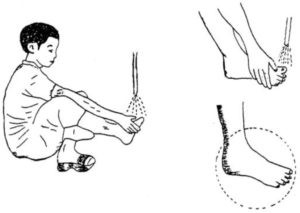
It is essential to offer Prayer while the Wudu is intact. If your Wudu remains intact, then more than one Prayer can be performed just with one Wudu. This means that the state of Wudu is necessary when one performs Prayer, but for each Prayer repetition of Wudu is not necessary if the previous ablution is still valid.
Factors which break the state of Wudu:
- Passing wind.
- Urination even if a drop has passed out.
- Passing stool in however small quantity.
- Sleeping, dozing off to the degree that if one were without a support, one would not be able to keep balance.
- Menstruation and ejaculation.
- About vomiting and bleeding, opinions are divided but minor bleeding from any part of the body by an ordinary cut, etc., or throwing-up of a little food during belching should not be counted as bleeding and vomiting. Otherwise, after vomiting and bleeding, Wudu should be performed again.
In some situations, as described below, Wudu alone is not enough and it is necessary to take a full bath before offering any formal Prayer.
- In Case of Women
- After each menstruation when the flow of blood has completely stopped.
- After childbirth when the bleeding has finally stopped. Note: During these bleeding periods, women are not required to perform formal Prayers.
- In Case of Men and Women
- After seminal ejaculation or orgasm, whether resulting from conjugation or from any other cause. The same applies to night discharges during sleep.
- Sexual contact between man and woman, even without ejaculation and however brief it may be.
Some prerequisites and conditions exist regarding the offering of Prayers. They are as follows:
- The intention to perform a Prayer must be made prior to the beginning of the Prayer.
- The Prayer should be offered within the fixed time allotted for that particular Prayer. However, if it is not possible to perform a Prayer in time due to extenuating circumstances, that Prayer can be offered later but not at forbidden times.
- The body should be clean from all filth and properly covered during the Prayer.
- The place of Prayer must be neat and clean.
- The person must face towards the direction of the Qiblah unless that’s not physically possible due to illness. Qiblah means facing the Ka‘bah in Makkah.
During Prayer, the body should be decently covered, particularly around the private parts. In case of men, this can be defined as an area of the body beginning from the navel down to the end of the knee-cap. According to most schools of Jurisprudence, men should also cover their heads when praying. Women should cover their entire body, including their arms, but excluding the hands and feet.
Adhan is widely recognized as the call to Prayer all over the world. The Mu’adhdhin, the person who says the Adhan, should stand in a prominent position with his face turned towards the Qiblah. The Mu’adhdhin should touch his ears with his index fingers, right finger touching the right ear and the left finger touching the left, and recite the Adhan in a loud voice. He should turn his face towards the right when saying the words, Hayya ‘alas-Salah and turn his face to the left while reciting the words Hayya ‘alal-Falah.
The words of Adhan are as follows:
ٱللَّٰهُ أَكْبَرُ
Transliteration:
Allahu Akbar (four times)
Translation:
Allah is the Greatest. (four times)
أَشْهَدُ أَن لَّا إِلَٰهَ إِلَّا ٱللَّٰهُ
Transliteration:
Ashhadu alla ilaha illallah (two times)
Translation:
I bear witness that there is none worthy of worship except Allah. (two times)
أَشْهَدُ أَنَّ مُحَمَّدًا رَسُولُ ٱللَّٰهِ
Transliteration:
Ashhadu anna Muhammadar Rasulullah (twice)
Translation:
I bear witness that Muhammad is the Messenger of Allah. (two times)
حَيَّ عَلَى ٱلصَّلَاةِ
Transliteration:
Hayya ‘alas-Salah (two times)
Translation:
Come to Prayer. (two times)
حَيَّ عَلَى ٱلْفَلَاحِ
Transliteration:
Hayya ‘alal-Falah (two times)
Translation:
Come to success. (two times)
ٱللَّٰهُ أَكْبَرُ
Transliteration:
Allahu Akbar (two times)
Translation:
Allah is the Greatest. (two times)
لَا إِلَٰهَ إِلَّا ٱللَّٰهُ
Transliteration:
La ilaha illallah
Translation:
There is none worthy of worship except Allah.
During the Adhan for Fajr Prayer, the following words are also recited twice after saying, Hayya ‘alal-Falah:
ٱلصَّلَاةُ خَيْرٌ مِنَ ٱلنَّوْمِ
Transliteration:
Assalatu khairum-minan-naum (two times)
Translation:
Prayer is better than sleep. (two times)
After completion of the Adhan, listeners should recite the following prayer:
اَللّهُمَّ رَبَّ هَذِهِ الدَّعوَةِ التَّامَّةِ، وَالصَّلَاةِ القَائِمَةِ، آتِ مُحَمَّدًانِ الوَسِيلَةَ وَالفَضِيلَةَ، وَابعَثهُ مَقَامًا مَّحمُودَانِ الَّذِي وَعَدتَهُ إِنَّكَ لَا تُخلِفُ المِيعِاد
Transliteration:
Allahumma Rabba hadhihidda‘watit-tammati wassalatil qa’imati, ati Muhammada-nil-wasilata wal-fadilata waddarajatar-rafi‘ata, wab‘ath-hu maqamam-mahmuda-nilladhi wa’attahu. Innaka la tukhliful mi‘ad. (Bukhari, Kitabul-Adhan)
Translation:
O Allah, Lord of this Perfect Call, and of the Congregational Prayer, make Muhammad ﷺ a means of our access to You, and bless him with excellence and the lofty office, and grant him the most exalted station You have promised him. Verily, You do not go back on Your promise.
The Iqamah is recited when a congregational Prayer is about to commence. This is an indication that the Imam has taken his place facing towards the Ka‘bah and is ready to begin the Prayer. The Iqamah is a shorter version of the Adhan. The person who has recited the Adhan should also recite the Iqamah. (Sunan Tirmidhi, Abwabus-Salat, Bab Ma Ja‘a anna man Adhdhana fa huwa yuqim). However, in certain cases, another person may recite the Iqamah with the permission of the Mu’adhdhin or the Imam.
Other differences between the Adhan and the Iqamah are as follows:
- The Adhan is called aloud while the Iqamah is recited in a low tone.
- During the recitation of Iqamah, the fingers are not raised so as to touch the ears as is done in Adhan; instead the arms are left hanging straight by one’s sides.
- The sentence, Assalatu khairum-minan-naum is not recited in the Iqamah for Fajr prayer.
- During the Iqamah the sentence Qad qamatis-Salat, i.e. Salat is ready, is repeated twice after saying, Hayya ‘alal-Falah.
- During the Iqamah, the face is not turned towards the right or to the left when Hayya ‘alas-Salah and Hayya ‘alal-Falah are recited, as is done in the Adhan.
The text of the Iqamah is as follows:
ٱللَّٰهُ أَكْبَرُ ٱللَّٰهُ أَكْبَرُ . أَشْهَدُ أَن لَّا إِلَٰهَ إِلَّا ٱللَّٰهُ . أَشْهَدُ أَنَّ مُحَمَّدًا رَسُولُ ٱللَّٰهِ . حَيَّ عَلَى ٱلصَّلَاةِ . حَيَّ عَلَى ٱلْفَلَاحِ . قَدْ قَامَتِ ٱلصَّلَاةُ . ٱللَّٰهُ أَكْبَرُ ٱللَّٰهُ أَكْبَرُ . لَا إِلَٰهَ إِلَّا ٱللَّٰهُ
Transliteration:
Allahu Akbar, Allahu Akbar; Ashhadu alla Ilaha illallah; Ashhadu anna Muhammadar Rasulullah; Hayya ‘alas-Salah; Hayya ‘alal-Falah; Qad qamatis-Salatu, Qad qamatis-salah; Allahu Akbar, Allahu Akbar; La Ilaha Illallah
Translation:
Allah is the Greatest, Allah is Greatest; I bear witness that there is none worthy of worship except Allah; I bear witness that Muhammad ﷺ is the Messenger of Allah. Come to Prayer. Come to success. Salat is ready. Allah is the Greatest; Allah is the Greatest; There is none worthy of worship except Allah.